- Home
- Thomas E. Sniegoski
Monstrous Page 8
Monstrous Read online
Page 8
Isaac sat alone in a corner of the gymnasium listening to the distant call of the bad radio.
He wanted to be as far away as he could from the people of Benediction, afraid that the bad radio would make him try to hurt them.
As if on cue, the bad radio was suddenly stronger, blaring inside his head, filling both his ears—not just the Steve ear—with a buzzing static like a thousand bees trapped between a screen and a window. The sound made his legs and arms twitch.
He let out a little cry as he flopped upon his cot and had to wonder if people were looking at him. It didn’t really matter. He was used to people watching him. His mother said it was because he was different.
His mother, lost to the events of the previous night, that thought filled him with incredible sadness. So much had changed in such a short period of time. Isaac wished it could be back to the way it was, only cleaner and less cluttered, recalling the condition of the home that he’d lived in, the only oasis of order being his ultra-neat room.
He missed his room the most—and his mother. She was a good person.
Was a good person.
He remembered what the cats had done to her, and the bad radio became even louder.
More insistent.
It made him angry . . . made him want to lash out. To hurt.
That was what the bad radio did.
But suddenly he realized there was something else . . . a different sound . . . a different signal. Not just trying to fill him with anger so that he would hurt someone. This sound . . . this signal was different. This was trying to speak to him.
Reaching out to him—
And him alone.
As if trying to say hello.
* * *
“Isaac,” Doc Martin called as she and Burwell approached the young man sitting on a cot in the far corner of the gymnasium, away from the other survivors.
Isaac did not look up. His hands covered his ears, and he was rocking back and forth.
“Hey, Isaac?” she said, standing directly in front of him.
He still didn’t answer, continuing to rock.
“Isaac, are you hearing it now?” Burwell asked, coming forward as well. “Are you hearing the alien receiver?”
“The bad radio,” Doc Martin corrected.
“What?”
“He calls the signal the bad radio,” she explained.
Isaac was rocking faster now and had started to hum.
“What the hell is wrong with him?” Burwell asked. “Is this because of the bad radio business, or is he just crazy?”
Doc Martin spun on the man. “Don’t you dare,” she said with a ferocious snarl. “After what the poor kid’s been through I’m surprised he’s doing this well.”
Burwell ignored her outburst and continued to stare at the young man. “I need to know if he can help . . . if he’ll help.”
“I’d say the answer to that is . . . ,” Doc Martin began, but didn’t get the chance to finish.
“You want help?” Isaac suddenly asked. He was still rocking, hands still over his ears.
Burwell glared at Doc Martin, then pushed past her to squat in front of Isaac.
“Yes, Isaac,” he said. “We have to find the bad radio.” He paused, waiting for a response, but Isaac just continued to rock.
“We can’t let another bad radio do what the first one did here on the island,” Burwell continued. “Do you see all these people here?” He gestured toward the others in the gymnasium, although Isaac didn’t look up.
“All these people are going to be in real danger if we don’t do something to stop the new bad radio.”
“It’s not where it was anymore,” Isaac said.
“So that means that I need to find it,” Burwell said. “And I think you might be able to help me.”
Doc Martin jumped in. “Isaac, you don’t have to do anything that you—”
“Can you find it, Isaac?” Burwell spoke over her. “Can you help me find the bad radio so I can destroy it, and keep everyone on the island safe?”
“Isaac, don’t listen to him,” Doc Martin said. “You can stay right here and—”
“Yes,” Isaac said. He stopped rocking and lowered his right hand. His left continued to hover around his ear, as if considering adjusting the hearing aid there.
“Yes, I think I could help you find the bad radio.”
CHAPTER SEVENTEEN
Delilah’s legs were shaking so badly that she couldn’t stand and simply dropped to her knees in the office.
“You okay?” Deacon asked.
It was the first time she’d ever actually spoken to him, and she was surprised by how low and deep his voice was.
“Yeah, I’m good.”
She looked around the office. Phil, Mallory, and Mason were there, as were two other women that she didn’t recognize.
“What the hell is going on?” she asked as she climbed to her feet.
“Everything’s gone crazy,” Mason said nervously. “The patients got out of bed and . . .” His voice trailed off, and he turned away to stare out of windows noisily pattered by rain.
Delilah looked to Mallory. The woman appeared haggard, her hair wild, her hands and arms covered in deep scratches.
She shook her head slowly, her gaze not focused on anything in particular. “It shouldn’t be possible,” she said. “But they . . . they just started getting up.”
“Where’s everybody else?” Delilah asked before thinking about what the answer might be.
Phil looked to Mallory, and then shrugged. “It got crazy so fast . . .”
His eyes filled up, and he waved his hands in front of his face as if to calm down.
“Does anybody else see how insane this all is?” asked one of the women whom Delilah didn’t recognize. She wasn’t wearing scrubs or a housekeeping uniform, so Delilah assumed she was a secretary of some kind. There was panic in her voice.
“Let’s everybody just stay calm,” Deacon said, his low voice strangely calming. “Somebody is bound to realize that we’re not around and—”
“They could all be dead,” Mallory said.
Deacon glared at her.
“You saw them,” Mallory went on. “There was only one thing on their brain-damaged minds, and that was throttling the life out of us.”
Deacon rubbed his neck, and Delilah wasn’t sure, but she thought there might be some bruising on his throat.
The other woman went to the desk and picked up the phone, holding the receiver to her ear. “Still nothing,” she said, randomly pushing buttons on the body of the phone.
“Storm’s knocked everything out,” Deacon said.
Something heavy bumped against the door, making them all jump.
Deacon brought a thick finger to his lips, staring at the door. There were a few more thumps, and then nothing. They remained quiet for a few moments, the sounds of the storm outside seeming to grow louder in the silence.
“Do you think it’s the storm?” Delilah finally asked no one in particular.
“What are you talking about?” Mallory questioned.
“The reason why this is happening . . . with the patients . . . Could the storm somehow . . . ?”
“Hey, there’s a police car out there!” Mason exclaimed. He was still standing by the window but had moved closer, practically pushing his face against the glass.
They all ran to the window, jamming into the space so they could see too. Delilah was smaller and managed to find an area right beside Mason, who had his hands pressed to the glass. The window looked out on the front of the hospital, and, sure enough, a cruiser had just turned the corner and was heading toward the entrance.
Delilah squinted through the rain-spattered window. Something seemed to be wrong—the car seemed to be moving erratically. “Why are they driving that way?”
“What way?” Mason asked. “There’s nothing . . .”
The police cruiser suddenly veered off the road and struck a light post, sending the metal pole crash
ing down on top of it.
There was a collective gasp from the small group as everyone tried to squeeze closer to the window for a better view.
The front doors of the cruiser opened, and two officers tumbled out, the driver falling to the ground. The second officer, holding his arm as if injured, ran to the driver, pulling him up from the rain-swept street.
“What the hell is that?” Phil said, tapping the glass with a fingernail.
At first Delilah couldn’t see it, and then her mind mistook it for a piece of wind driven debris. But as she pressed her forehead harder against the cold glass, she realized that she was looking at a small black dog.
“What the hell?” Deacon grumbled, as more animals appeared, all coming from the same direction as the cruiser had.
Delilah felt her heart begin to race. Even this far away they terrified her.
The police must have heard them and turned toward the pack.
That was what they were—a pack of dogs of every conceivable size, shape, and color. Delilah had never seen anything like it. It was as if they were moving as one entity—as if the pack were one giant, running animal with many legs.
Converging on the police officers.
The two tried to run, but they were clearly hurt, the officer with the injured arm having a hard time moving the driver along. After a short distance they stopped and drew their guns, firing on the pack of dogs, each shot sounding like a mini clap of thunder. They seemed to have hit several of the animals, but it wasn’t enough.
Delilah wanted to look away as the officers began to run again, but the fear held her tightly and whispered in her ear, This is why you’re afraid.
The pack swarmed upon them. There were two or three more pops of gunfire, but then it was over.
The police officers were done.
Finally Delilah was able to push herself away from the window.
Something was very, very wrong. Not just here at Elysium, but in the city itself.
The others slowly drifted away from the rain-spattered glass, expressions of shock on their pale faces.
“I’ve never seen dogs move like that,” Deacon said, shaking his head, clearly trying to wrap his brain around what he’d just observed.
“You just seen them,” Mason exclaimed. “You just seen dogs move exactly like that.”
“Yeah,” Deacon said. “But it isn’t right.”
“They should never have left their car,” one of the secretaries said on the verge of tears. She found her way to the chair behind the desk and carefully sat down. “If they’d stayed in the car . . .”
“What the hell is going on out there?” Phil asked. He was looking at his phone, searching for some answers. “Piece of shit phone,” he grumbled, but still held on to the device like a lifeline.
They were all quiet again, the tension within the confined space growing by the second.
“What are we going to do?” the other secretary asked. “We can’t just stay here like this; we have to . . .”
“We have to get out of here,” Delilah said firmly, turning herself toward the door, thinking of her mother and her son back at the apartment. Whatever was happening here was very likely happening there, and she needed to be with them.
CHAPTER EIGHTEEN
It was like some heavy-metal-video version of hell—the sky filled with billowing black smoke and birds.
“All right, people, let’s move!” Langridge yelled, leading the way out of the relative safety of the cracked fuselage.
Once outside Sidney chanced a quick look back at the twisted wreckage of the plane and gasped. She couldn’t believe that any of them had survived, feeling a momentary pang of guilt at the thought of Fitzy and Karol.
“Move! Move!” Langridge ordered, and Sidney turned her focus to the airport hangars near the end of the runway.
“Stay together!” the security officer continued as they moved quickly in a group away from the plane.
Things were actually going well, and they seemed to be making progress, the smoke from the burning fuel providing some semblance of cover from the swirling mass of death above them.
Until the plane exploded.
The blast was deafening, the shock wave so strong that it threw the group to the tarmac. Snowy was the first to her feet, running to Sidney, licking her face to be sure she was fine, then trotting to the others, sniffing and nudging each as if to say Get moving.
Sidney managed to push herself to her knees, then slowly stood, swaying dizzily, waiting for the high-pitched whine in her head to fade as she faced the burning wreckage.
And that was when she knew they were in trouble.
“Run,” she said . . . and then screamed, turning toward the others and waving her arms. They didn’t seem to understand at first, but then Sidney saw the expressions of terror spread across their faces as they all started to run.
The air was filled with burning birds, set afire by the blast. And although their wings were aflame, they were heading directly for the small group on the tarmac.
Snowy was faster than all of them, running ahead and then stopping to watch them reach her before setting off again. To Sidney it felt like a weird dream, one where she was running and running but never seeming to get any closer to her destination.
And then Langridge went down in front of them. Sidney wasn’t sure what had happened, but they all stopped to help, which was the worst thing they could have done.
“Keep going!” Langridge screamed, frantically waving her arms as Cody tried to help her up.
But it was too late.
The birds were upon them.
The cloud of living, fluttering, flying things descended on them, the only sounds being the flapping of their wings. Fewer were burning, but all were trying to kill them.
Sayid’s idea of the rain ponchos and face masks had been a good one, but the protection was short-lived as razor-sharp talons sliced through the thick plastic.
Langridge was up, limping forward, and they were once again fighting their way through the cyclone of beaks and feathers. Their progress was slow, with Sayid, Langridge, and Snowy in the lead, Cody and Rich close behind them, and Sidney and Bob bringing up the rear. Snowy was barking crazily, darting back and forth, snapping at the birds, literally pulling them from the air. She gave them a violent shake before dropping them on the tarmac and going after the next.
Suddenly Sidney realized that Bob was no longer beside her.
“We’ve lost Bob!” she screamed over the pounding wings, stopping to look back, flailing her arms and swatting aside sparrows and robins that dove to attack her.
She caught sight of Bob, not too far back, and surged toward him. So many birds swirled around her that it was nearly impossible to see. Sharp beaks pecked at the flesh of her hands, but she fought them, not about to let them have the satisfaction of slowing her down.
There was a brief break in the maelstrom, and she could see Bob standing just ahead of her, his arms hanging at his side, his back to her. “Bob!” she screamed, but he didn’t move. Birds fell upon him, and as she drew closer, she could see the blood running over the dark plastic of his poncho.
“Bob, we gotta move,” Sidney cried, reaching for the man’s shoulder even as a blue jay picked mercilessly at her outstretched hand. She spun him around, promising to be his guide through the storm. . . .
A gull was perched on his chest. It had managed to get underneath the face mask and was savagely dismantling Bob’s face. His eyes were gone, nothing more than dark, sucking holes into which the gore-covered bird plunged its needle-sharp beak.
“Oh God,” Sidney gasped as his body finally fell to the pavement. She leaped back, nearly tripping over Snowy, who had come to her side. “C’mon, girl, go!” she screamed, waving her arms, but the dog would not leave without her, and she was having a hard time moving forward.
Her visor was covered with a mixture of blood and bird droppings. Birds continued to peck at her hands and arms as she frantically tried to wa
ve them off. Then something hit her from behind, like a basketball thrown as hard as possible, and she went down, the wind knocked from her lungs. Kneeling upon the tarmac, trying to catch her breath again, she turned to see an owl sitting near her, its wing broken, its huge, silver-covered right eye watching her.
“Yeah, screw you, too!” she said with a snarl as the owl hobbled toward her.
And that was when Bob fell upon her, driving her to her stomach. She struggled beneath him, managing to turn herself over.
His right eye had been replaced with a wet, silvery copy that pulsed with a life all its own, zeroing in on her as she pried at his bloody hands, now closed around her throat.
Faithful Snowy was suddenly there again, plowing into Bob and knocking him from atop her. The dog was enraged, wildly biting at Bob’s (can he even be called Bob anymore) neck and arms.
The flock of birds was growing heavier, choking in their numbers, and Sidney knew they had to move or die. She climbed to her feet, swatting birds aside as they continued to swarm her, then reached out and yanked on Snowy’s tail. The shepherd spun, the white fur around her mouth stained red with blood. Sidney felt a momentary twinge of fear then quickly gestured for the dog to follow her.
Together they fought their way through the storm of wings, their ponchos nearly in tatters. Sidney hoped they were going in the right direction but couldn’t be sure—even Snowy seemed confused. She couldn’t help but wonder what had happened to the others and why only Snowy had come to her rescue, and then she heard the sound, just below the flapping of wings.
It was a growling sound and getting louder. Sidney moved toward it, holding on to Snowy’s poncho and steering the dog along beside her. There was no mistaking the sound of a revving motor and the blare of a horn.
It was as if the birds knew she might be saved and were making one last-ditch effort to get her. They hit her from all sides, trying to fly up under her poncho, through her mask, but she fought them until she felt herself begin to falter.
“Sidney!” screamed a voice that she recognized at once as Cody’s. She tried to cry out, but a gull came down at her visor, smashing into it full force and knocking her backward to the ground. She looked up into a sky filled with swirling bodies that seemed to grow thicker by the moment.

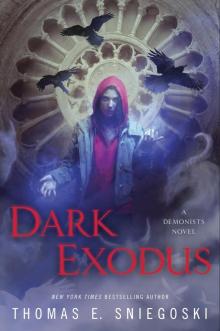 Dark Exodus
Dark Exodus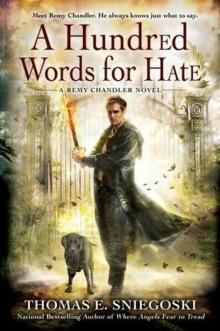 A Hundred Words for Hate rc-4
A Hundred Words for Hate rc-4 The Fallen
The Fallen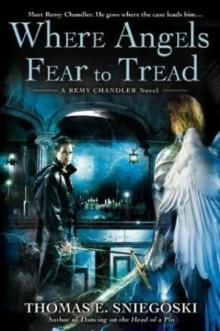 Where Angels Fear to Tread rc-3
Where Angels Fear to Tread rc-3 Armageddon
Armageddon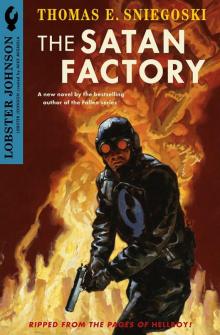 The Satan Factory
The Satan Factory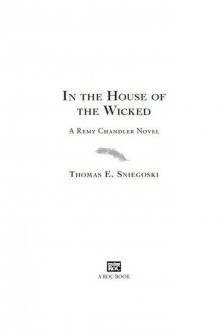 In the House of the Wicked: A Remy Chandler Novel
In the House of the Wicked: A Remy Chandler Novel A Hundred Words for Hate
A Hundred Words for Hate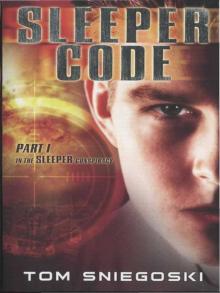 Sleeper Code
Sleeper Code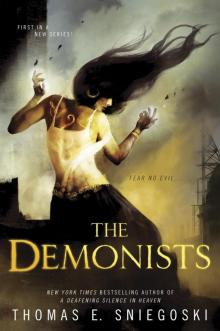 The Demonists
The Demonists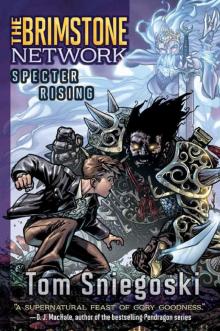 Specter Rising (Brimstone Network Trilogy)
Specter Rising (Brimstone Network Trilogy)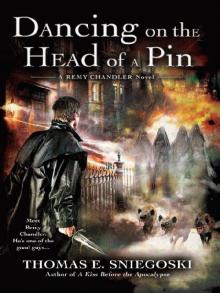 Dancing on the Head of a Pin
Dancing on the Head of a Pin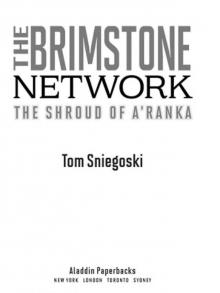 The Shroud of A'Ranka (Brimstone Network Trilogy)
The Shroud of A'Ranka (Brimstone Network Trilogy)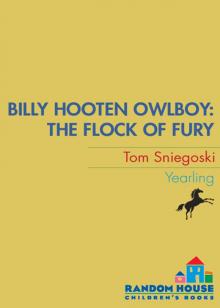 The Flock of Fury
The Flock of Fury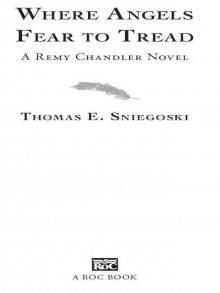 Where Angels Fear to Tread
Where Angels Fear to Tread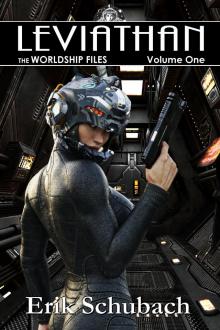 Leviathan
Leviathan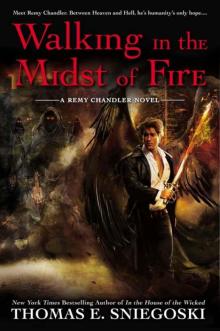 Walking In the Midst of Fire: A Remy Chandler Novel
Walking In the Midst of Fire: A Remy Chandler Novel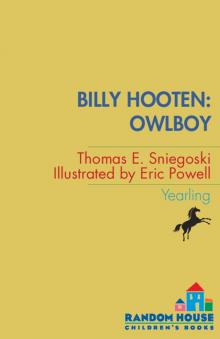 Billy Hooten
Billy Hooten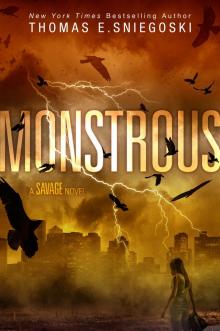 Monstrous
Monstrous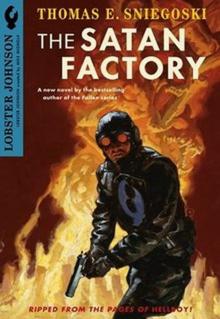 Lobster Johnson: The Satan Factory
Lobster Johnson: The Satan Factory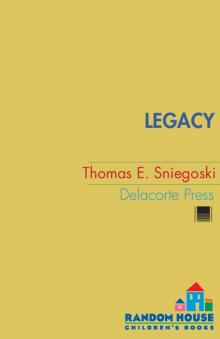 Legacy
Legacy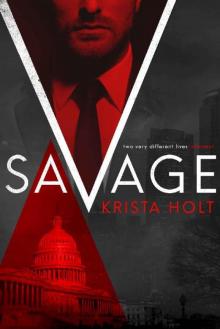 Savage
Savage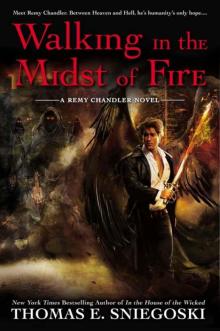 Walking In the Midst of Fire rc-6
Walking In the Midst of Fire rc-6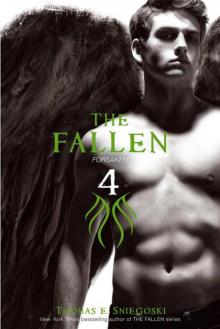 The Fallen 4
The Fallen 4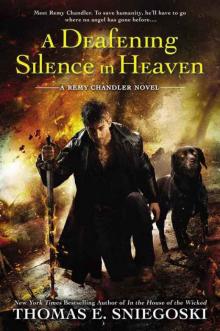 A Deafening Silence In Heaven
A Deafening Silence In Heaven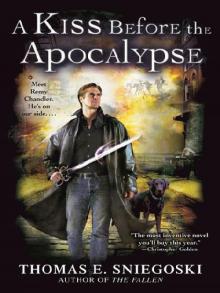 A Kiss Before the Apocalypse
A Kiss Before the Apocalypse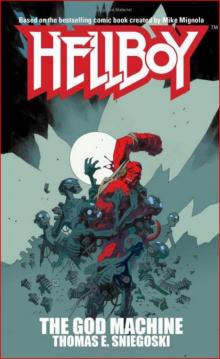 The God Machine
The God Machine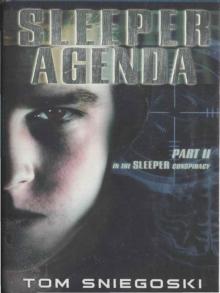 Sleeper Agenda
Sleeper Agenda The Girl with the Destructo Touch
The Girl with the Destructo Touch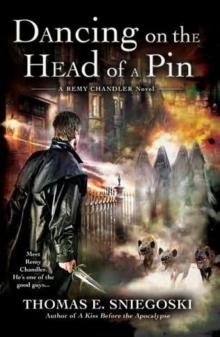 Dancing On the Head of a Pin rc-2
Dancing On the Head of a Pin rc-2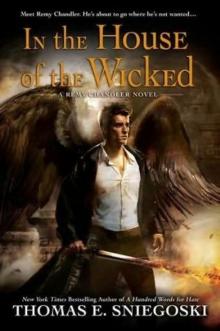 In the House of the Wicked rc-5
In the House of the Wicked rc-5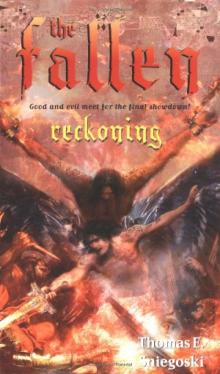 Reckoning f-4
Reckoning f-4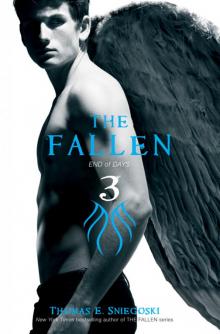 The Fallen 3
The Fallen 3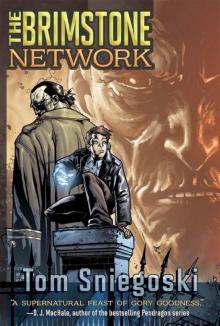 The Brimstone Network (Brimstone Network Trilogy)
The Brimstone Network (Brimstone Network Trilogy)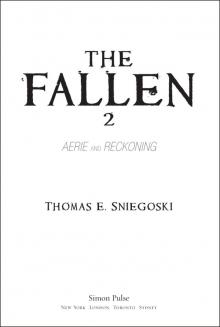 The Fallen 2
The Fallen 2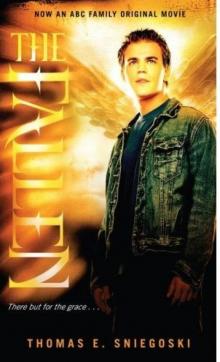 The Fallen f-1
The Fallen f-1